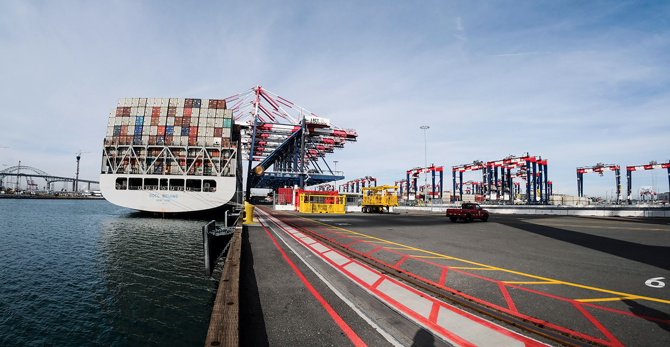
The U.S. Customs and Border Protection has been using a paper-based system for collecting taxes, duties and other fees from shipping vessels at U.S. ports that’s been around since 1792 – when George Washington still presided over the country.
“Most of the processes in place for offloading cargo from shipping lines are already electronic, but it’s the exchange of payments that remain antiquated,” said Kathleen Druitt, program manager for the Revenue Modernization Office of Finance at CPB.
It’s finally about to get a makeover.
The Customs agency has selected the Port of Long Beach as one of four ports nationwide to test a pilot program to convert the centuries old cash or check-based fee, duty and tax payment system to allow electronic payments.
A shipping vessel cannot offload cargo until it clears paperwork with CBP. For that to happen now, the vessel must get an appointment with the port control tower, which oversees incoming and outgoing cargo traffic.
However, most of the containers on the ship have already been cleared as the CPB received that information at least 24 hours before the ship arrived, Jaime Ruiz, spokesman for CPB said.
“However, the ship itself needs to be cleared. Together with some containers that are selected for random inspection, we inspect for pests, stowaways, drugs, etc.” he said.
Once CBP determines that the vessel is in compliance of all U.S. laws, it collects fees. Up to this point, data input of what’s on the ship, inspection information and other processes are all electronic, but payments remain rooted in “an evolved version of form 368, which was first created near the birth of this country,” Druiit said. There is an option to pay the fees, duties and tax via checks.
“The captain of the ship literally hands over either the cash or a check to us,” Ruiz said.
Initially, the pilot program was launched to automate the calculations of the fees and taxes and to generate receipts for the offloading process, Druitt said, but in December it expanded to include electronic payments.
“One of the significant results in a few short weeks since we started doing this is the 50 percent cut in process time,” said Rich Koike, chief CBP officer for vessel operations at the Long Beach and Los Angeles port complex. “With electronic payments, what used to take 20 minutes now takes 10 minutes,” he said.
Barco and Skechers Team Up
Two apparel companies in Los Angeles teamed up this month to launch a new scrubs line for healthcare professionals.
It’s the first collaboration for Manhattan Beach-based footwear and apparel brand Skechers USA Inc. and Barco Uniforms, headquartered in Gardena and makers of healthcare uniforms.
“Skechers by Barco represents the next evolution of scrubs, not only for Barco Uniforms, but for the healthcare profession,” said David Murphy, chief executive of Barco, in a statement. “Together with Skechers, we developed a lifestyle brand that delivers fashion, exceptional quality and fit, at a price point that is accessible to virtually every healthcare professional.”
This isn’t the first for Skechers in this market; the company recently added the Skechers Health Care Pro slip resistance collection for medical professionals.
“Doctors, nurses and medical professionals have come to know and love Skechers for our workplace footwear…” Michael Greenberg, president of Skechers said in a statement.
For the Barco collection, he added that the company expected to leverage that familiarity into the apparel arena.
Publicly traded Skechers had a stellar year in 2017. Full-year financials aren’t out yet but third-quarter net sales increased 16.2 percent to $1.09 billion compared to the same period a year ago. Net income rose 41.8 percent to $92.3 million, or 59 cents a share, the company said. Shares closed Monday, Jan. 22 at $40.54.
Port of Long Beach Scholarships
The Port of Long Beach is accepting applications for its summer internship on-site along with applications for college students interested in international trade, logistics and other port-related work.
The scholarships range from $1,000 to $5,000 and the deadline is March. 1.
Manufacturing and trade reporter Shwanika Narayan can be reached at (323) 556-8351 or [email protected].
